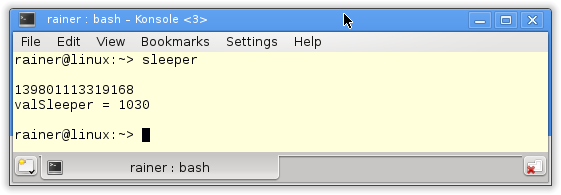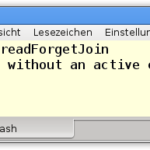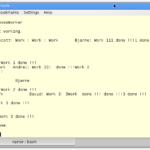Thread Arguments
A thread gets its data by copy or by reference. By default, you should use by copy. Why? In case your thread gets its data by reference, you have to be extremely careful about the lifetime of the arguments.
Thread arguments
A thread is a variadic template. So it can get an arbitrary number of arguments.
But now to the difference between getting the argument by copy or by reference.
std::string s{"C++11"}
std::thread t([=]{ std::cout << s << std::endl;});
t.join();
std::thread t2([&]{ std::cout << s << std::endl;});
t2.detach()
Precisely said, it is not the thread that gets the arguments in this example, but the lambda function. But that makes no difference for my argumentation. So the first thread t1 gets its data per copy ([=]), and the second thread t2 gets its data by reference ([&]).
What dangers are hidden in these lines? Thread t2 gets its string s by reference and is afterward detached from the lifetime of its creator. On the one hand, the lifetime of the string is bound to the lifetime of the invocation context, and on the other hand, the lifetime of the global object std::cout is bound to the lifetime of the main thread. So it may happen that the lifetime of the string s or the lifetime of std::cout is shorter than the lifetime of the thread t2. Now we are deep in the area of undefined behavior.
Not convinced? Let’s have a closer look, what undefined behavior may look like.
 Modernes C++ Mentoring
Modernes C++ Mentoring
Do you want to stay informed: Subscribe.
1 2 3 4 5 6 7 8 9 10 11 12 13 14 15 16 17 18 19 20 21 22 23 24 25 26 27 28 29 30 31 32 33 |
// threadArguments.cpp #include <chrono> #include <iostream> #include <thread> class Sleeper{ public: Sleeper(int& i_):i{i_}{}; void operator() (int k){ for (unsigned int j= 0; j <= 5; ++j){ std::this_thread::sleep_for(std::chrono::milliseconds(100)); i += k; } std::cout << std::this_thread::get_id() << std::endl; } private: int& i; }; int main(){ std::cout << std::endl; int valSleeper= 1000; std::thread t(Sleeper(valSleeper),5); t.detach(); std::cout << "valSleeper = " << valSleeper << std::endl; std::cout << std::endl; } |
The question is, which value valSleeper has in line 26 valSleeper as a global variable? The thread t gets as a work package a function object of type Sleeper, the variable valSleeper, and the number 5 (line 27). The crucial observation is that the thread gets valSleeper by reference (line 9) and will be detached from the lifetime of the main thread (line 28). Then it will execute the call operator of the function object (lines 10 – 16). This method counts from 0 to 5, sleeps in each iteration 1/10 of a second, and increments i by k. In the end, it displays its ID on the screen. Following Adam Riese (a German proverb), the result must be 1000 + 6 * 5 = 1030.
But what happened? Something is going wrong.

There are two issues. On the one hand, valSleeper is 1000; on the other hand, the ID is missing on the console. So, that is undefined behavior. The reason is that the lifetime of the main thread ends before the child thread has performed its calculation or written its ID to std::cout.
In case the main thread waits via t.join() until this child thread is done with its work, we get the expected result.
int main(){ std::cout << std::endl; int valSleeper= 1000; std::thread t(Sleeper(valSleeper),5); t.join(); std::cout << "valSleeper = " << valSleeper << std::endl; std::cout << std::endl; }

What’s next?
Thinking about the lifetime of the threads is by far not the only issue with threads. Both threads, the main thread and the child thread, share two objects. That is std::cout and the variable valSleeper. Now, I described the classical recipe for a data race or – to say it differently – for undefined behavior. In the next post, I will deal with shared variables between threads. (Proofreader Arne Mertz, Alexey Elymanov)
Thanks a lot to my Patreon Supporters: Matt Braun, Roman Postanciuc, Tobias Zindl, G Prvulovic, Reinhold Dröge, Abernitzke, Frank Grimm, Sakib, Broeserl, António Pina, Sergey Agafyin, Андрей Бурмистров, Jake, GS, Lawton Shoemake, Jozo Leko, John Breland, Venkat Nandam, Jose Francisco, Douglas Tinkham, Kuchlong Kuchlong, Robert Blanch, Truels Wissneth, Mario Luoni, Friedrich Huber, lennonli, Pramod Tikare Muralidhara, Peter Ware, Daniel Hufschläger, Alessandro Pezzato, Bob Perry, Satish Vangipuram, Andi Ireland, Richard Ohnemus, Michael Dunsky, Leo Goodstadt, John Wiederhirn, Yacob Cohen-Arazi, Florian Tischler, Robin Furness, Michael Young, Holger Detering, Bernd Mühlhaus, Stephen Kelley, Kyle Dean, Tusar Palauri, Juan Dent, George Liao, Daniel Ceperley, Jon T Hess, Stephen Totten, Wolfgang Fütterer, Matthias Grün, Phillip Diekmann, Ben Atakora, Ann Shatoff, Rob North, Bhavith C Achar, Marco Parri Empoli, Philipp Lenk, Charles-Jianye Chen, Keith Jeffery, Matt Godbolt, Honey Sukesan, bruce_lee_wayne, Silviu Ardelean, schnapper79, Seeker, and Sundareswaran Senthilvel.
Thanks, in particular, to Jon Hess, Lakshman, Christian Wittenhorst, Sherhy Pyton, Dendi Suhubdy, Sudhakar Belagurusamy, Richard Sargeant, Rusty Fleming, John Nebel, Mipko, Alicja Kaminska, Slavko Radman, and David Poole.
| My special thanks to Embarcadero |  |
| My special thanks to PVS-Studio |  |
| My special thanks to Tipi.build |  |
| My special thanks to Take Up Code |  |
| My special thanks to SHAVEDYAKS |  |
Modernes C++ GmbH
Modernes C++ Mentoring (English)
Rainer Grimm
Yalovastraße 20
72108 Rottenburg
Mail: schulung@ModernesCpp.de
Mentoring: www.ModernesCpp.org




Leave a Reply
Want to join the discussion?Feel free to contribute!